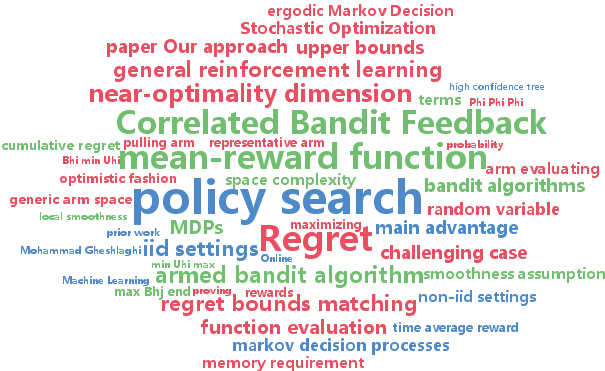policy search
-
Robert Grande and Thomas Walsh and Jonathan How
Sample Efficient Reinforcement Learning with Gaussian Processes (pdf)
This paper derives sample complexity results for using Gaussian Processes (GPs) in both model-based and model-free reinforcement learning (RL). We show that GPs are KWIK learnable, proving for the first time that a model-based RL approach using GPs, GP-Rmax, is sample efficient (PAC-MDP). However, we then show that previous approaches to model-free RL using GPs take an exponential number of steps to find an optimal policy, and are therefore not sample efficient. The third and main contribution is the introduction of a model-free RL algorithm using GPs, DGPQ, which is sample efficient and, in contrast to model-based algorithms, capable of acting in real time, as demonstrated on a five-dimensional aircraft simulator.
-
Bruno Scherrer
Approximate Policy Iteration Schemes: A Comparison (pdf)
We consider the infinite-horizon discounted optimal control problem formalized by Markov Decision Processes. We focus on several approximate variations of the Policy Iteration algorithm: Approximate Policy Iteration, Conservative Policy Iteration (CPI), a natural adaptation of the Policy Search by Dynamic Programming algorithm to the infinite-horizon case (PSDP$_\infty$), and the recently proposed Non-Stationary Policy iteration (NSPI(m)). For all algorithms, we describe performance bounds, and make a comparison by paying a particular attention to the concentrability constants involved, the number of iterations and the memory required. Our analysis highlights the following points: 1) The performance guarantee of CPI can be arbitrarily better than that of API/API($\alpha$), but this comes at the cost of a relative---exponential in $\frac{1
-
Mohammad Gheshlaghi azar and Alessandro Lazaric and Emma Brunskill
Online Stochastic Optimization under Correlated Bandit Feedback (pdf)
In this paper we consider the problem of online stochastic optimization of a locally smooth function under bandit feedback. We introduce the high-confidence tree (HCT) algorithm, a novel anytime $\mathcal X$-armed bandit algorithm, and derive regret bounds matching the performance of state-of-the-art algorithms in terms of the dependency on number of steps and the near-optimality dimension. The main advantage of HCT is that it handles the challenging case of correlated bandit feedback (reward), whereas existing methods require rewards to be conditionally independent. HCT also improves on the state-of-the-art in terms of the memory requirement, as well as requiring a weaker smoothness assumption on the mean-reward function in comparison with the existing anytime algorithms. Finally, we discuss how HCT can be applied to the problem of policy search in reinforcement learning and we report preliminary empirical results.


